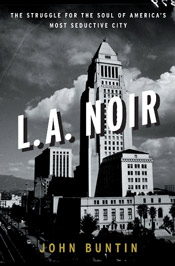|
Other cities have histories. Los Angeles has legends.
 Mid-century Los Angeles. A city sold to the world as “the white spot of America,” a land of sunshine and orange groves, wholesome values and Hollywood stars, protected by the world’s most famous police force, the LAPD. But behind the image lies a hidden world of “pleasure girls” and crooked cops, ruthless tycoons and corrupt politicians, and Eastern gangsters on the make. Into this underworld came two men — one LA’s most notorious gangster, the other its most famous police chief — Mid-century Los Angeles. A city sold to the world as “the white spot of America,” a land of sunshine and orange groves, wholesome values and Hollywood stars, protected by the world’s most famous police force, the LAPD. But behind the image lies a hidden world of “pleasure girls” and crooked cops, ruthless tycoons and corrupt politicians, and Eastern gangsters on the make. Into this underworld came two men — one LA’s most notorious gangster, the other its most famous police chief —
each prepared to battle the other for control of the city.
Former street thug turned featherweight boxer, Mickey Cohen left the ring for the rackets, first as mobster Benjamin “Bugsy” Siegel’s enforcer, then as his protégé. A fastidious dresser and an unrepentant killer, the diminutive Cohen was Hollywood’s favorite gangster — and L.A.’s preeminent underworld boss. Frank Sinatra, Robert Mitchum, and Sammy Davis, Jr. palled around with him; TV journalist Mike Wallace wanted his stories; evangelist Billy Graham sought his soul.
William H. Parker was the proud son of a pioneering law enforcement family from the fabled frontier town of Deadwood. As a rookie patrolman in the Roaring Twenties, he discovered that LA was ruled by a shadowy “Combination” — a triumvirate of tycoons, politicians, and underworld figures where alliances were shifting, loyalties uncertain, and politics was practiced with shotguns and dynamite. His life mission became to topple it — and to create a police force that would never answer to elected officials again. In the process, he created the modern LAPD and unwittingly paved the way for the city’s greatest tragedy, the Watts riots.
These two men — one morally unflinching, the other unflinchingly immoral — would soon come head to head in a struggle to control the city — a struggle that echoes unforgettably through the fiction of Raymond Chandler and movies like The Big Sleep, Chinatown, and L.A. Confidential. For more than three decades, from Prohibition through the Watts riots, their struggle convulsed the city, intersecting in the process with the agendas and ambitions of J. Edgar Hoover and Robert F. Kennedy Jr., Mike Wallace and Billy Graham, Lana Turner and Malcolm X and inspiring writers from Raymond Chandler to James Ellroy. Its outcome shaped American policing — for better and for worse — and helped to create the Los Angeles we know today.
|